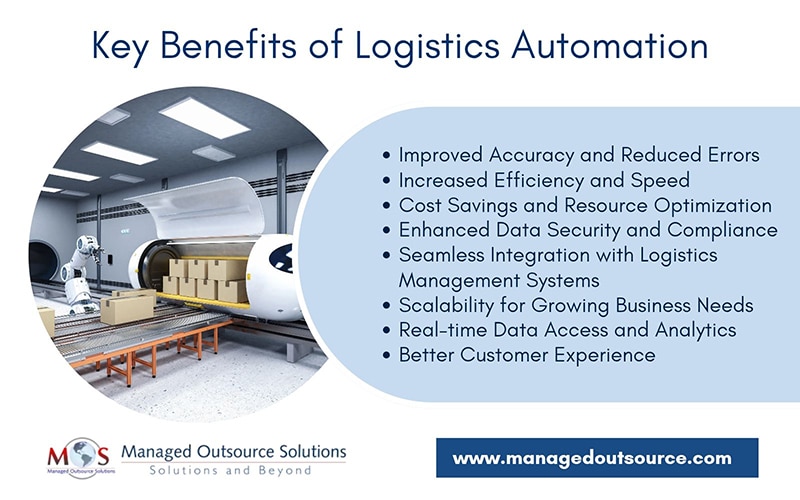In today’s fast-paced supply chain industry, efficiency and accuracy are crucial. Manual record keeping in transport operations can be time-consuming, error-prone, and costly. This is where logistics data entry solutions powered by automation come into play. Regarded as the best thing that can happen in any business, logistics automation involves a large number of specialists carrying out varied processes at each specific stage that contributes to the smooth movement of goods along the chain. The benefits of this technology are countless – saving on labor, inventory, and energy. In addition, automated processes are carried out faster, more precisely, qualitatively, more economically, and more efficiently. By integrating advanced technology and automation tools, businesses can streamline their supply chain operations, minimize errors, and enhance productivity. In this blog we will explore in detail the key benefits of automating transport-related documentation processes and why partnering with a data entry company can be a game-changer for your business.
What Is Logistics Automation as Applied to Transport Management?
Logistics automation covers all the functions that can be performed at the technological level. This includes a transportation management system (TMS) for managing the transportation and freight departments in each company. This concept assists with the work of all possible units – in the course of stock monitoring, planning, administrative, accounting, and management departments.
Logistics automation provides significantly higher control within the company. It can be considered as a process of reducing manual operations (manual entry of documents and processing of consignments) and the automatic receipt of the necessary information when ordering transport for the respective cargo. In addition, this automatic system receives notifications and updates in real-time. This helps in tracking loads and providing accurate information at all times.
Top Benefits of Logistics Automation for Growing Businesses
Below listed are some of the key benefits of logistics automation:
- Improved Accuracy and Reduced Errors: Manual input methods often lead to human errors such as typos, incorrect values, or misplaced information. These errors can result in shipment delays, incorrect invoicing, and customer dissatisfaction. Automation ensures data accuracy by leveraging artificial intelligence (AI) and machine learning (ML) algorithms to extract, validate, and input logistics data with minimal errors. By using external back-office support for logistics data entry, businesses can eliminate inconsistencies and enhance data integrity, leading to more reliable logistics operations.
- Increased Efficiency and Speed: Traditional workflows for entering shipping or tracking details are labor-intensive and slow. Employees manually inputting information from invoices, shipping documents, and tracking reports can take hours or even days. Automation accelerates this process by instantly capturing and processing data, reducing the turnaround time significantly. Utilizing automation tools can help businesses handle large volumes of logistics data seamlessly, ensuring quick and accurate processing without delays.
- Cost Savings and Resource Optimization: Hiring and training a dedicated team for manual data entry can be expensive. Additionally, human errors in logistics can lead to financial losses due to misrouted shipments, chargebacks, or regulatory fines. Automation reduces the need for a large workforce, cutting labor costs and operational expenses. By entrusting domain experts in information processing, businesses can optimize their resources, focusing on core logistics operations rather than time-consuming record keeping tasks.
- Enhanced Data Security and Compliance: Shipping records often contains sensitive information such as customer details, shipment records, and financial transactions. Manual methods for record keeping increases the risk of security breaches, misplaced records, or unauthorized access. Transportation management ensure secure data handling through encryption, access control, and audit trails. Data entry outsourcing firms also comply with industry regulations and standards, ensuring that businesses meet compliance requirements without worrying about data security risks.
- Seamless Integration with Logistics Management Systems: Automation tools can integrate seamlessly with existing logistics management systems, such as transportation management systems (TMS), warehouse management systems (WMS), and enterprise resource planning (ERP) software. This integration allows real-time data updates, tracking, and analytics. In short, automation can help businesses implement customized solutions that fit their operational needs, ensuring smooth workflows and improved logistics performance.
- Scalability for Growing Business Needs: As businesses expand, logistics operations become more complex, requiring efficient data management solutions. Manual data entry methods struggles to keep up with increased data volumes, leading to bottlenecks. Automation provides scalability by handling high dataset volumes without compromising accuracy or efficiency. By investing in smart record keeping capabilities, businesses can scale operations without worrying about data processing limitations, ensuring continued growth and efficiency.
- Real-time Data Access and Analytics: Automated supply chain documentation allows businesses to access real-time data insights, thereby improving decision-making and operational efficiency. With instant data retrieval and analysis, companies can identify trends, optimize routes, reduce transit times, and enhance customer service. Providing analytics-driven solutions can help logistics businesses leverage data insights to improve forecasting, reduce operational costs, and enhance overall supply chain performance.
- Better Customer Experience: Customers expect accurate and timely updates on their shipments. Manual data entry errors or delays in updating tracking information can lead to customer dissatisfaction. Improving customer experience through logistics automation ensures that customers receive real-time updates, improving their overall satisfaction. By using data logistics, businesses can build trust and strengthen client relationships through reliable and timely logistics operations.
For businesses looking to stay competitive in the supply chain industry, automated data entry in logistics is no longer an option but a necessity. Right from improving accuracy and efficiency to reducing costs and enhancing security, automation offers a range of benefits. Partnering with a reliable data entry company ensures seamless integration of automation tools, allowing logistics businesses to focus on growth and operational excellence.
Streamline Your Logistics with Automation!
Explore our logistics data entry services and take your supply chain management to the next level.





